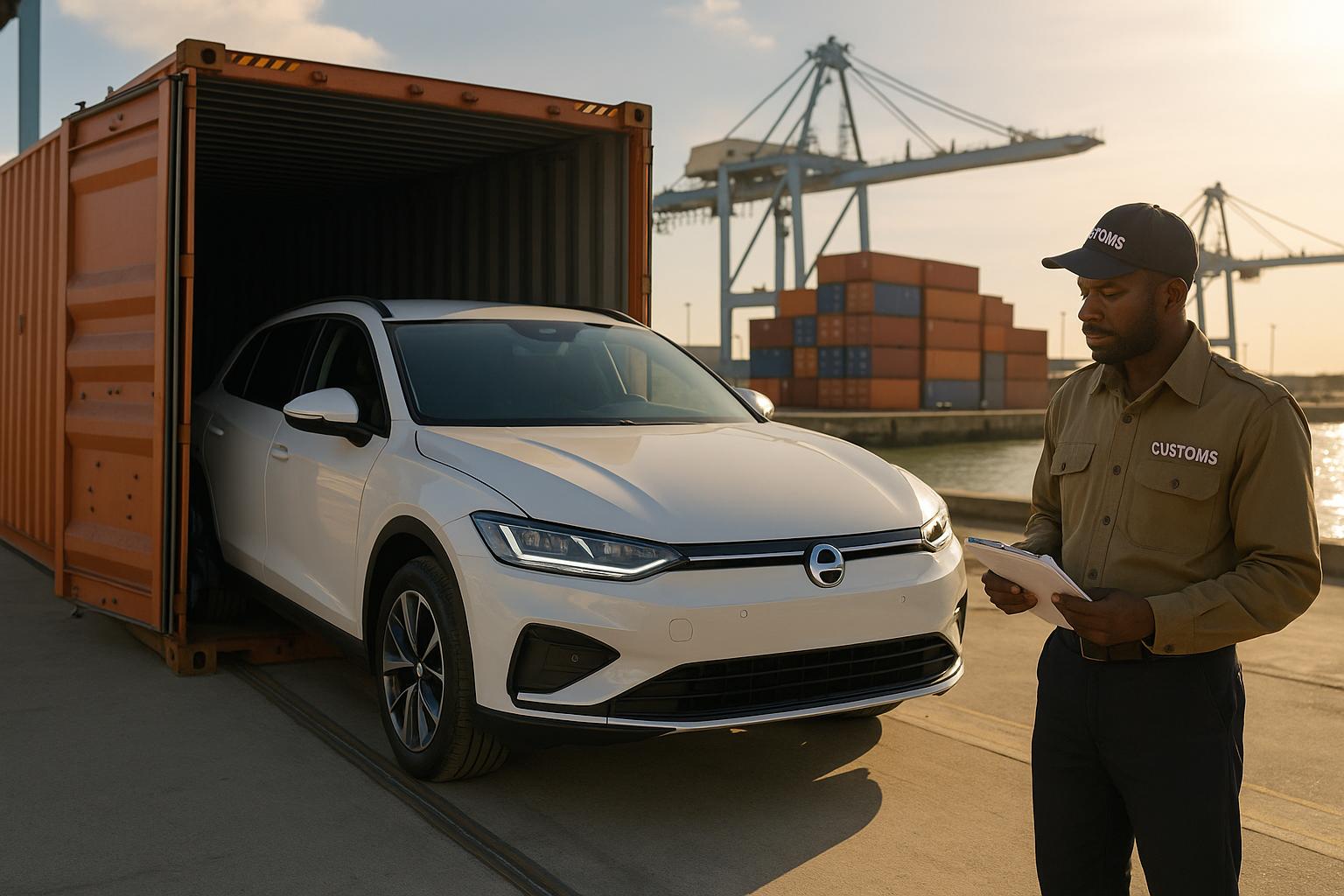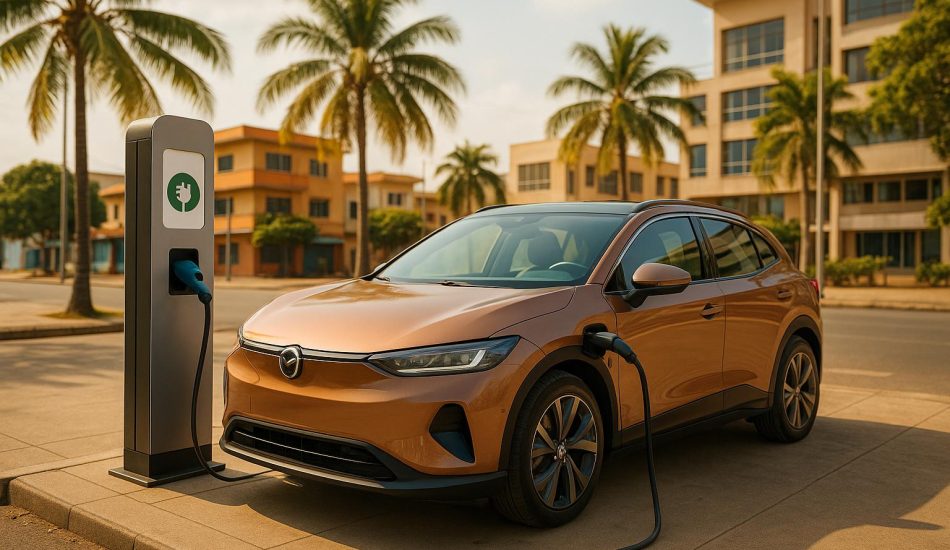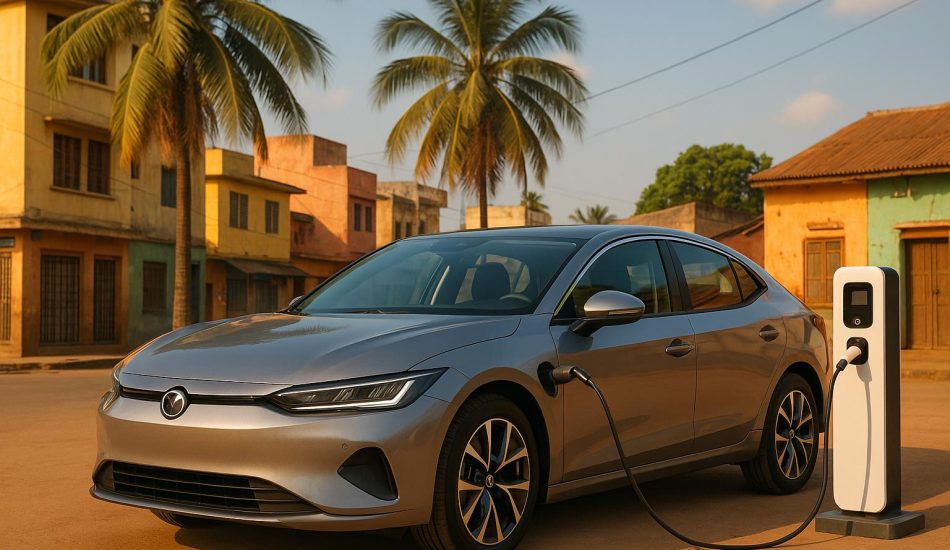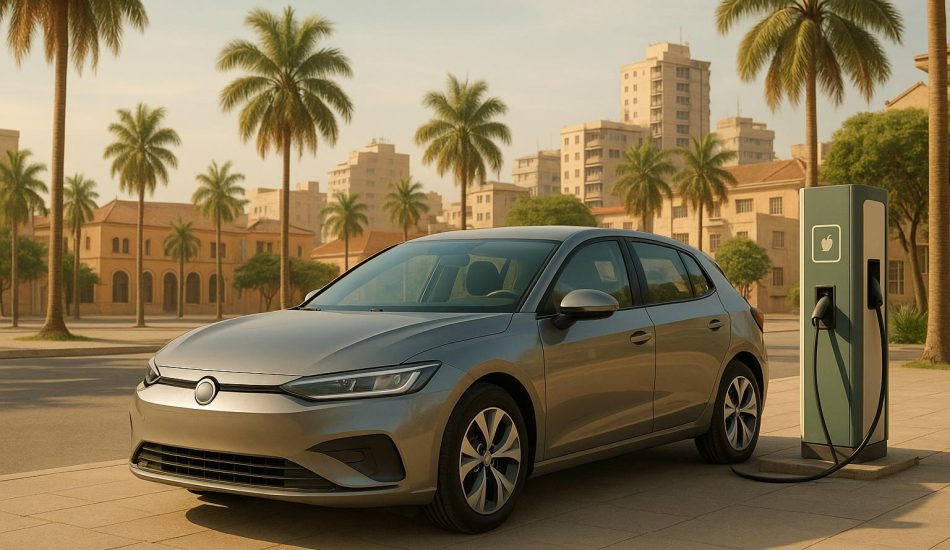
Liberia’s new 2025 EV import rules aim to simplify the process of bringing electric vehicles (EVs) into the country while offering tax exemptions and promoting cleaner transportation. The updated regulations, effective January 2025, provide reduced import costs, streamlined procedures, and incentives for fully electric vehicles (BEVs). However, there are specific eligibility requirements, documentation needs, and costs you should know before starting.
Key Takeaways:
- Tax Exemptions: BEVs are fully exempt from import duties and VAT (10% and 12.5%, respectively). Hybrid vehicles receive partial incentives.
- Eligible Vehicles: EVs must be less than 10 years old, meet safety standards, and be compatible with Liberia’s electrical systems.
- Additional Costs: Local fees (e.g., port handling) range from $1,500 to $2,500, even with tax exemptions.
- Required Documents: Includes original title, bill of sale, MSDS for the battery, E-Form M, and a Cargo Tracking Note (CTN).
- Shipping Costs: From Europe, expect $1,147–$3,000 for transport, plus customs and local charges.
Import Process Overview:
- Pre-Purchase Planning: Research shipping companies and choose between RORO or container shipping. Get quotes and confirm EV compatibility.
- Documentation: Secure all required documents, including pre-shipment inspections and CTN.
- Customs Clearance: Submit paperwork, pay local fees, and coordinate with clearing agents.
- Shipping Timeline: Shipping takes about 20 days from Europe, with the entire process lasting up to six weeks.
By following the rules and preparing thoroughly, you can avoid delays and extra costs while contributing to Liberia’s push for cleaner transportation.
Import Eligibility and Vehicle Requirements
Understanding which EVs are eligible can help you make an informed purchase. The updated rules outline clear criteria for determining whether an EV qualifies for import and the associated tax incentives or duty exemptions. Here’s a closer look at the types of EVs and brands that meet these requirements.
Accepted EV Types and Brands
Liberia’s 2025 regulations cover a broad range of EV categories to accommodate various transportation needs.
Passenger vehicles make up the largest segment, including compact sedans, SUVs, and crossovers from leading manufacturers. Light commercial vehicles, such as electric vans and small trucks, are also included. These are particularly appealing for businesses seeking to lower operating costs while contributing to cleaner urban environments.
EV24.africa connects buyers to vehicles from multiple global markets, including Europe, Asia (with a strong focus on China), North America, and Japan. This wide sourcing ensures options that cater to different budgets and preferences. The platform offers both new and used electric vehicles from well-known brands like Tesla, BYD, Leapmotor, ROX, Dongfeng, Geely, Hyundai, Toyota, and Suzuki.
Battery electric vehicles (BEVs) enjoy the most benefits under the new regulations, including full exemptions from VAT and customs duties. Hybrid vehicles also receive incentives, but the most generous perks are reserved for fully electric models, aligning with Liberia’s climate goals under the Paris Agreement.
Vehicle Restrictions and Exceptions
Not all EVs qualify – strict guidelines ensure that only modern, high-quality vehicles are imported. EVs must be less than 10 years old to meet eligibility requirements. Salvaged or heavily damaged vehicles are subject to stringent restrictions unless accompanied by certified refurbishment documentation.
This age limit ensures that imported EVs include the latest advancements in battery technology, improved driving ranges, and compatibility with modern charging networks. Such features make newer models more dependable and better suited to Liberia’s infrastructure.
The regulations do allow exceptions for certified refurbished vehicles, provided they meet safety and roadworthiness standards. Proper documentation proving compliance with international charging and battery safety requirements is mandatory.
Additionally, all imported EVs must be compatible with Liberia’s electrical systems and adhere to global safety standards for charging and battery performance.
EV24.africa simplifies the import process by offering Delivered Duty Paid (DDP) and Free on Board (FOB) options.
These restrictions aim to balance accessibility with safety and infrastructure readiness. By focusing on newer, well-maintained vehicles, Liberia is building a dependable EV fleet capable of integrating seamlessly into its growing charging network while supporting long-term sustainability goals.
Familiarizing yourself with these eligibility and vehicle requirements is essential before delving into the specifics of the import process.
Step-by-Step EV Import Process
Once you’ve confirmed that your electric vehicle (EV) meets Liberia’s eligibility requirements, it’s time to dive into the import process. This involves careful planning, gathering the right documents, and coordinating with multiple parties across various countries. Breaking the process into manageable steps can help you avoid delays and ensure your vehicle arrives safely.
Pre-Purchase Planning
Start by researching shipping companies that specialize in transporting vehicles to West Africa. Since not all carriers serve Liberia, focus on companies with established routes and experience handling EVs. Given the specific requirements for EV batteries, choosing the right carrier is crucial.
Request quotes from multiple carriers that are experienced in shipping EVs. Shipping costs from Spain to Liberia typically range from $1,147 to $1,692. Keep in mind that additional customs and local charges will add another $1,500 to $2,500 to the total cost.
Choose a shipping method based on your budget and timing. Roll-On/Roll-Off (RORO) shipping is usually the most affordable option, while container shipping offers better protection for higher-value vehicles. If you’re flexible with timing, shared container services can help reduce costs. For urgent shipments, air cargo is available but significantly more expensive.
When requesting quotes, provide details such as the year, make, model, VIN, shipping weight, and dimensions of your vehicle. Since EV batteries require special handling, make sure to inform carriers that you’re shipping an electric vehicle. This ensures accurate pricing and proper handling procedures.
Liberia’s import duties include a 10% duty on the vehicle’s value and 21% VAT. However, under the 2025 regulations, EVs are fully exempt from these charges. That said, local fees of approximately $1,500 still apply, even with the tax exemptions.
Once you’ve finalized shipping arrangements, gather the necessary paperwork to keep the process smooth.
Required Documents and Approvals
Proper documentation is essential for a hassle-free import process. Here’s what you’ll need:
- Original state title and a detailed bill of sale or commercial invoice.
- Shipper and consignee details, including names, addresses, and contact information.
- Material Safety Data Sheet (MSDS) for the EV battery, detailing its chemical composition and safety procedures.
- E-Form M, required by Liberian customs for all vehicle imports.
- Shipping bill of lading, packing list, and CCVO.
- Relevant identification documents.
The shipper’s details must include your full name or company name, address, phone number, and EIN/Tax ID or foreign passport information. For the consignee, provide the name and contact details of the person or entity receiving the vehicle in Liberia.
The MSDS for the EV battery is particularly important. This document provides safety guidelines and emergency response information. Most EV manufacturers can supply this, but it’s best to request it early.
You’ll also need to obtain an E-Form M from the Liberia Customs Service. Since requirements can change, contact them directly for the latest procedures.
For shipments valued at $3,500 or more, a BIVAC pre-shipment inspection is mandatory. This inspection costs 1.5% of the shipment’s value. Skipping this step can lead to penalties of 10–30% of the shipment’s value.
Additionally, Liberia requires a Cargo Tracking Note/Advanced Cargo Declaration (CTN/ACD) for all shipments. This system helps customs monitor incoming cargo and streamline the clearance process.
Customs Clearance and Shipping Timeline
Once your documents are in order, you can begin the customs clearance process. Proper documentation and timely communication are essential to avoid delays.
- Deliver the vehicle to the carrier and pay the required fees before departure.
- The transit time from Spain to Liberia usually takes around 20 days, but the entire process can take up to six weeks.
- Send the release or bill of lading to your clearing agent in Liberia as soon as your vehicle ships. This allows them to start customs preparations while the vehicle is in transit.
- Notify both the car transporter and Liberia Customs that you’re importing an EV. This ensures the necessary handling procedures are in place and helps customs prepare for the documentation review.
Be aware that factors like seasonal demand, port congestion, and unexpected delays can affect your timeline. Stay in touch with your shipping company to manage any changes.
The customs clearance process involves filing a declaration with details about your vehicle, paying applicable fees, and obtaining formal release from customs. Depending on your plans, the vehicle can be cleared for immediate use, stored temporarily, or transported to another location within Liberia.
EV imports may require additional approvals from transportation, safety, and other regulatory authorities. These extra steps can extend the clearance timeline, so it’s important to plan for potential delays.
Import Costs, Duties, and Fees
Understanding all import costs is crucial for accurate budgeting and avoiding unexpected expenses. While Liberia’s 2025 regulations bring significant savings through tax exemptions, there are still mandatory costs to account for after securing these exemptions.
Customs Duties and Tax Exemptions
One of the standout benefits of Liberia’s 2025 EV import regulations is the complete removal of standard vehicle import taxes. Typically, Liberia Customs charges a 10% duty and 12.5% VAT. Under the new rules, 100% electric vehicles are entirely exempt from these charges. For example, importing a $30,000 EV would usually incur $6,750 in duties. Additionally, the Ministry of the Economy of Liberia has announced exemptions from internal taxes and a gradual reduction in import duties for traditional, hybrid, and electric vehicles. However, to qualify for the full exemption, the vehicle must be fully electric. Hybrid vehicles may receive reduced rates but are not eligible for complete exemption.
Beyond these tax savings, there are other costs to consider that will affect your final import expenses.
Additional Costs to Consider
Even with tax exemptions, certain mandatory fees remain, including:
- Shipping Costs: Shipping a vehicle from the Netherlands to Liberia costs between $2,162 and $3,000, depending on the carrier and service.
- Cargo Tracking Note (CTN): This required document for all shipments to Liberia costs between $518 and $618.
- Local Handling Charges: These fees, which cover port expenses, clearing agent services, and local transportation, typically range from $1,500 to $2,500.
Here’s a breakdown of the key costs:
| Cost Category | Amount (USD) | Notes |
|---|---|---|
| Import Duty | $0 | Fully exempt for 100% EVs |
| VAT | $0 | Fully exempt for 100% EVs |
| Shipping (Netherlands) | $2,162 – $3,000 | Depends on carrier and service |
| Cargo Tracking Note | $518 – $618 | Mandatory for all shipments |
| Local Handling | $1,500 – $2,500 | Includes port and clearing fees |
While these costs are lower than they would be without the exemptions, they still represent a significant investment. Careful budgeting is essential to ensure a smooth import process.
sbb-itb-99e19e3
Compliance Tips and Best Practices
Importing an electric vehicle (EV) to Liberia requires careful planning. While the 2025 regulations present opportunities, success hinges on following the correct steps to avoid delays, penalties, and added costs.
Best Practices for Import Success
To ensure a smooth import process, strict compliance with regulations is essential. The cornerstone of this process is accurate documentation and verification. Before shipping your vehicle, secure a validated Cargo Tracking Number (CTN) through the National Port Authority’s online system. This is a non-negotiable requirement for all shipments to Liberian ports. Without a valid CTN, vehicles will not be loaded or unloaded.
Another critical step is completing the mandatory pre-shipment inspection. Skipping this inspection can lead to penalties, so make it a priority to avoid unnecessary fines.
When choosing an EV, work with reputable platforms tailored to African markets. For example, EV24.africa provides verified listings from trusted dealers offering brands like Tesla, BYD, Leapmotor, and Geely. The platform ensures transparency in pricing and specifications while vetting dealers experienced in African import requirements, reducing risks tied to unverified sellers.
Engaging early with key institutions – such as the EPA, RREA, and the Ministry of Land, Mines, and Energy – can help you stay aligned with compliance requirements. After clearing customs, submit cost details to the Ministry of Commerce and Industry (MOCI) for price approval. This step is essential for finalizing vehicle registration and ensuring legal operation in Liberia.
Common Mistakes to Avoid
To sidestep common pitfalls, focus on the best practices outlined above. One of the most expensive errors is neglecting the pre-shipment inspection, which can result in fines ranging from 10% to 30% of the shipment’s value.
Incomplete or inaccurate documentation is another frequent issue. Ensure all vehicle specifications match your import documents precisely, as even minor discrepancies can lead to customs delays and additional expenses.
Avoid working with unverified sellers or dealers unfamiliar with African import protocols. Such choices can result in receiving vehicles that fail to meet Liberia’s technical standards or, worse, falling victim to fraud. Always verify seller credentials and prioritize platforms that offer buyer protections and verified dealer networks.
Another common oversight is poor financial planning. Many importers focus solely on the vehicle’s purchase price or potential tax exemptions, neglecting other costs like shipping, CTN fees, and local handling charges. To avoid surprises, create a detailed budget that accounts for all required expenses before making a purchase.
Infrastructure is another critical consideration. Liberia’s energy grid and charging infrastructure are still evolving. Importing an EV without assessing local power availability and charging options could limit the vehicle’s usability. Research your area’s infrastructure and consider backup solutions to ensure functionality.
Finally, remember that importing an EV is not a one-and-done process. Stay updated on policy changes, financial incentives, and infrastructure developments by monitoring announcements from relevant government agencies.
Conclusion
Importing an electric vehicle (EV) into Liberia in 2025 comes with a set of strict regulations, but following these rules is essential to take advantage of the available incentives. This guide provides the key steps for a successful EV import, helping you navigate the process smoothly.
Proper preparation is crucial. Make sure to gather all necessary documentation, and account for customs duties, shipping costs, and local fees. By staying organized and compliant, you can avoid unnecessary delays or complications.
It’s also important to consider Liberia’s infrastructure challenges. With rural electrification below 5% and a heavy reliance on fossil fuels, planning for charging solutions is critical. As the country works toward embracing electric mobility, these challenges require thoughtful solutions.
For added support, rely on trusted platforms like EV24.africa. They offer access to verified dealer networks and transparent pricing for brands such as Tesla, BYD, and Geely, making it easier to handle compliance and paperwork.
Taking these steps not only ensures a seamless import process but also contributes to Liberia’s broader goals of sustainable transportation and development. As Robert Taliercio, World Bank Division Director, emphasized:
"We recognize Liberia’s achievements in maintaining peace and stability since 2003. A critical focus of our engagement with Liberia is to help the country experience the dividends of peace through more and better jobs and improved quality of life for all Liberians."
This underscores that EV adoption is about more than just individual convenience – it’s a step toward a greener, more sustainable future for Liberia.
FAQs
What steps should I follow to import an electric vehicle to Liberia under the 2025 regulations?
To bring an EV into Liberia under the 2025 regulations, you’ll need to gather a few essential documents. These include the certificate of title, purchase invoice, passport copy, driver’s license, international insurance policy, and bill of lading. Make sure the EV complies with Liberia’s safety and emissions standards, as non-compliant vehicles could be turned away at the border.
Another key point to note: EVs older than 10 years might face restrictions, so double-check the vehicle’s age before making your purchase. Also, plan for additional costs like customs duties and taxes to avoid any financial surprises. With proper preparation, the import process can go smoothly, ensuring you meet all the requirements of the updated regulations.
What costs should I consider when budgeting for importing an EV to Liberia in 2025?
When you’re mapping out your budget for importing an EV, make sure to account for the purchase price of the vehicle, tariffs (which can go as high as 25%), shipping costs, customs duties, and local taxes. Beyond these, there are often overlooked expenses like charging equipment, insurance, maintenance, and even battery replacements that can add up quickly.
It’s smart to set aside an extra 10-15% as a cushion for any unexpected costs that might pop up. Don’t forget to consider currency exchange rates and any Liberia-specific charges to make sure your budget covers everything accurately.
What challenges might I encounter with Liberia’s infrastructure when importing and using an electric vehicle?
Liberia faces some hurdles when it comes to adopting electric vehicles (EVs). For starters, the availability of charging stations is quite limited, which means finding a convenient spot to recharge isn’t always easy. On top of that, the road networks in many areas are underdeveloped, especially in rural regions, which can make driving less smooth and even challenging at times.
One of the bigger concerns is the unreliable electricity supply. This inconsistency can complicate charging your EV, both in terms of availability and reliability. These challenges mean EV owners may need to plan carefully to ensure their vehicles remain practical for everyday use. That said, as more people start using EVs, there’s hope that infrastructure improvements will follow, paving the way for easier and more efficient EV ownership in the future.




